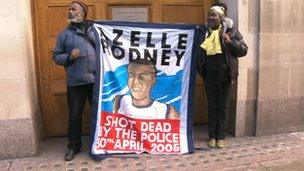Azelle Rodney inquiry: Family urge unlawful killing decision
- Published
An inquiry is being held into the death of Azelle Rodney who was shot by a police officer in 2005
The family of a man fatally shot by a police officer has urged the inquiry into his death to find that it was an unlawful killing.
Azelle Rodney, 24, was shot six times in Edgware, north London, after the car he was in was stopped on 30 April 2005.
Police officers claimed they feared the occupants were armed with a sub-machine gun to rob a Colombian drugs gang.
Leslie Thomas, counsel for Mr Rodney's mother Susan Alexander, said the facts were "chilling".
'Demonstrable untruths'
In his closing speech to the inquiry, Mr Thomas said the forensic evidence showed that the police had provided a false account of the precise sequence of events.
He said officers had told "demonstrable untruths" as to why Mr Rodney was shot outside a busy pub in north London.
Azelle Rodney's mother, Susan Alexander, describes seeing the officer who shot her son for the first time at the inquiry into his death
Mr Thomas said that the undercover operation to stop the feared robbery had been an "extraordinary failure" because Mr Rodney was not given the chance to surrender.
Although police did not find machine guns in the car, officers did recover other firearms.
The other two people in the vehicle, Frank Graham and Wesley Lovell, were subsequently jailed for possession of firearms.
Samantha Leek QC, counsel for an officer identified only as E7, who opened fire on Mr Rodney, argued that he had honestly believed Mr Rodney was reaching for a machine gun.
She said E7 had to shoot to protect himself and his colleagues.
'Protecting life'
Anne Studd QC, for the Metropolitan Police, told the inquiry that it was too easy to say, with the benefit of hindsight, that the force had made fatal mistakes.

Demonstrators held up a banner outside the inquiry
She said the team had taken decisions aimed at protecting life, rather than taking it.
Ms Studd said the way events had occurred showed how difficult such operations were for highly trained officers, forced to making dynamic decisions when faced by dangerous men.
Ms Alexander said: "This has been a long and difficult process, but I am glad that there has finally been some public scrutiny of the circumstances in which my son was killed.
"In the new year I would like to see the chairman make the strongest possible findings when he delivers his report, given the damning evidence and expert opinion that has been heard during the course of the inquiry."
An inquiry is being held into Mr Rodney's death instead of an inquest because of sensitive intelligence information that would have to be withheld from a coroner.
The hearing began on 3 September.
- Published17 December 2012
- Published6 November 2012
- Published15 October 2012
- Published20 September 2012